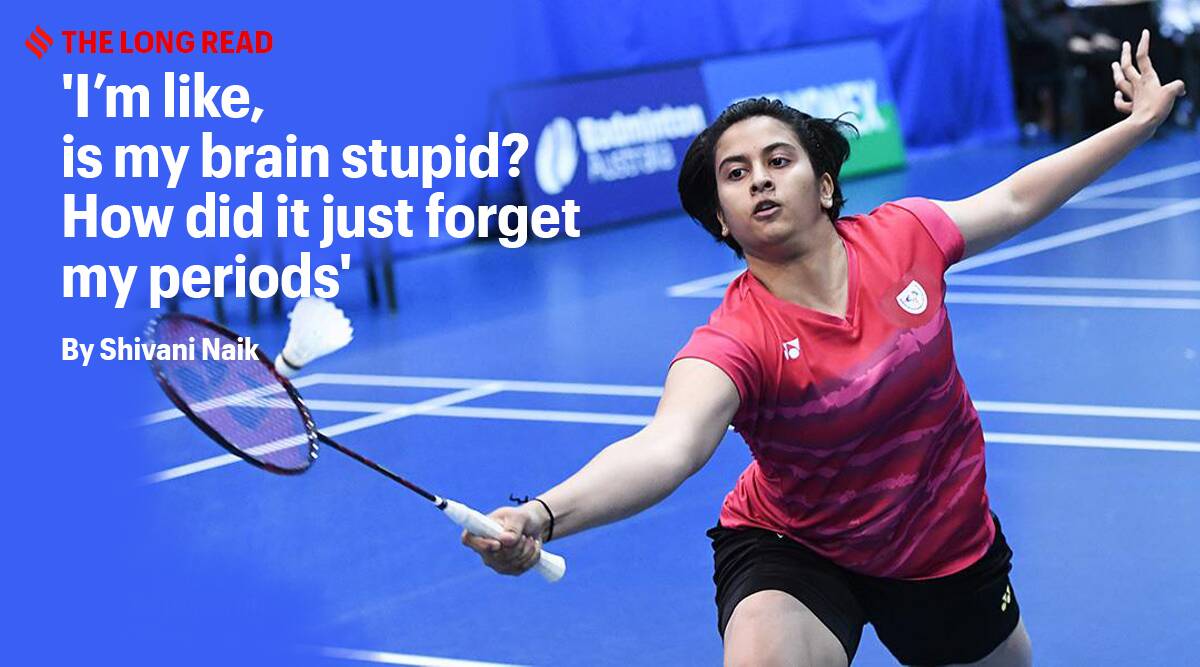Former international doubles shuttler Anoushka Parikh recalls sitting across the doctor, taking in the diagnosis, that didn’t join the dots immediately to why she had suddenly gained weight.
Thank you for reading this post, don't forget to subscribe!Shared News: June 19, 2022 9:01:25 am
Anoushka Parikh’s career was hampered by a back injury and PCOD, a common irregular menstruation condition among elite athletes. (Express Photo)
First, they wouldn’t let her forget that she needed to lose weight after gaining 8 kg in five months. And then the gynaecologist – explaining polycystic ovary disorder (PCOD) in an over-cautious, but friendly, effort to simplify the condition – told Anoushka Parikh that her brain might be swamped and forgetting something: To instruct the body about the monthly menstruation.
The former international doubles shuttler recalls sitting across the doctor, taking in the diagnosis, that didn’t join the dots immediately to why she had suddenly gained weight. “So, she’s trying to explain PCO Disorder to me in a very colloquial manner. I still remember, she tells me, ‘Your brain is so occupied doing your routine and other things, that it is forgetting to produce all the functioning hormones.’”
“I’m like, is my brain stupid?”
“How did it just forget or miss out on doing something that it is bound to do?” Anoushka chuckles narrating what was a nightmare even back then, because women grow up knowing one thing from the literal pit of the stomach: Periods don’t ‘forget.’ Now, the brain was playing truant on her. “So basically, I was not ovulating, or it was not regular. So, I would get my period, but only for a day,” she says, recalling her struggle with comprehending what was going on with her body, though the world only fixated on her weight gain.
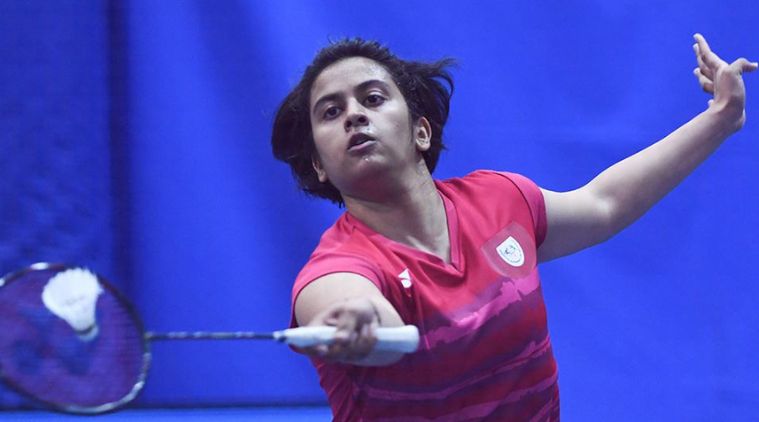
Anoushka Parikh was diagnosed with polycystic ovary disorder (PCOD), a common irregular menstruation condition among elite athletes.
Anoushka had moved from her home in Ahmedabad to the Gopichand Academy in Hyderabad in 2016, and as it happens for elite athletes prepping for international rigours, her training had altered. “Mainly what changed was the intensity of training. From 3-4 hours, it went close to 8 hours a day. And it was a new environment. Food changed big time. And in terms of my cycle, I started getting my period only for one day. I would get it regularly, but only for a day. And I had started to gain a lot of weight – 8 kilos in 5 months is not healthy for a badminton player. It affects your movement directly. And everything else. Everyone would just tell me that ‘you need to lose weight.’ But I wondered how do I lose weight. I’m training 8 hours. I can’t train more than that!”
Angelica Hirschberg, writing for the national library of medicine in National Centre for Biotechnology Information, highlighted the prevalence of the more severe PCOS in the topmost tier of athletes. “PCOS appears to be a common disorder among elite female athletes and is, indeed, the most frequent cause of menstrual disorders among Olympic sportswomen,” according to Hirschberg.
Researcher C. Fruhling, writing on the same, said that amenorrhea (absence of period) “is highly reported in athletic populations, with studies identifying the prevalence occurring in 3.4-66% of female athletes, compared to 2-5% of women in the general population.”
Mumbai-based gynaecologist Esha Chainani, specialising in polycystic ovary syndrome (PCOS), writing in The Swaddle, noted a host of fallouts of the condition, including insulin resistance, Type 2 diabetes, dyslipidemia (imbalance of lipids), heart disease, and infertility, a higher rate of developing mental health disorders such as anxiety, depression, mood disorders and eating disorders. Chainani also quoted hirsutism (hair growth on the face), and at the same time, hair-fall issues, as arising out of PCOS.
“The results of the study more than confirmed my suspicion that Indian women with PCOS were facing massive mental health challenges. 38 percent of these women were suffering from some kind of anxiety disorder and 18 percent were screened positive for a depressive disorder; this is significantly higher than the average prevalence of mental health disorders in India (4.7%),” she wrote. “Women with PCOS have an almost 7x risk of developing anxiety disorders and a 3x risk of developing depression. 50 percent of women with PCOS have insulin resistance (regardless of their weight), which basically means low energy,” she added.
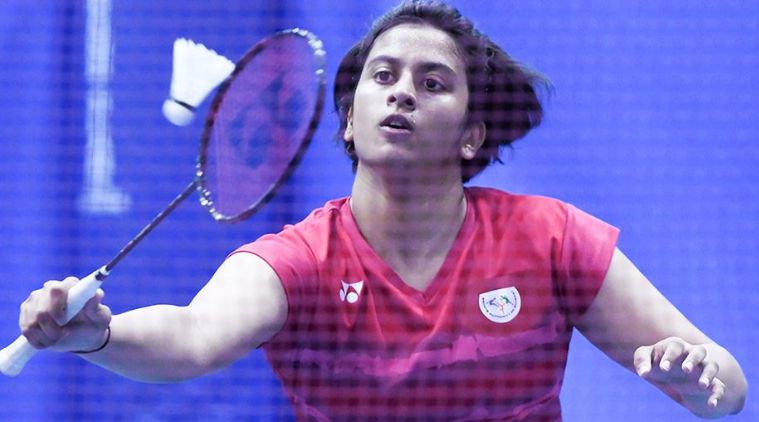
The PCOD condition left Anoushka emotionally scarred and burnt out of a promising career.
For athletes, weakness, fatigue, and sleepiness can amplify their troubles. Chainani reckons seeing it as a “purely physical problem that occurs a few days a month, as opposed to a chronic condition” can affect the overall quality of life.
Jibes galore
For Anoushka – competing in a fitness sport, day in, day out – the PCOD diagnosis began to answer some of her questions. But the fixation with her weight went on unabated even when she returned to Ahmedabad post the lifting of the 2020 lockdown.
“I went to the Ahmedabad club courts to play one day. I was sipping on water and a random person comes to me. I don’t know who he is, he’s an uncle. And he comes up to me and says ‘you are Anoushka, right?’ and I say yes. He said, ‘aapko PBL league mein dekha tha (saw you in PBL) when it happened in Ahmedabad. Udhar dekha tha, phir abhi dekh raha hoo (Saw you there, after that now)’. He said something like, ‘haan par abhi aapka weight thoda badh gayaa hai, na? Abhi aise khaate-peete ghar ke lag rahe ho (But now you seem to have put on some weight, no? Now, you look someone from a well-off family).’ He said that! I do not know him,” she recalls, still shocked at being cornered like that. “In that moment, I wanted to just give it back to him, but chose not to. Maybe I should have. I just turned around and just started playing again. I wanted to say, ‘main khaate peete ghar ki lagti hoon, toh tumhara kya jaata re?’ Like, I am from a khata peeta ghar, so why does that matter to you?” she recalls.
The problem of dealing with PCOD without knowing how to deal with it brought mental and emotional stress. “I think that was more of the burnout eventually than the weight,” she says. Not that those around her could look past the addition of kilos. “Unfortunately, everyone saw only the weight gain. And that became the focus, rather than my game. I would come back from a tournament, and they’d be like, ‘achha aur kitna weight badhaanaa hai (how much more weight do you plan to add)?’ Instead of asking me how my match went. Their focus was that. My thought was that my weight is not something you can deal with. But my skill is something you can deal with. So work on my game, so I can play without having to move so much or I can improve my strokes. But that’s not how the thinking goes,” she recalls the vicious cycle.
“Then my focus also went from my game to my weight. Everything I was doing was around my weight.” Trying to measure how deep a hole one is plunging into is always a bad idea.
***
Anoushka remembers being Miss Sunshine, happy and hopeful and dedicated to doing well, in an earlier time. A hyperactive child whose parents tried out the two months of tennis, then swimming, then skating, she loved badminton at the first clutch of the racquet at a local club when 6. “It just clicked, right from Day 1 I loved it, my racquet-shuttle coordination was good. Somehow, I was passionate right from Day 1, so I would not miss a single day. Parties and social, you needn’t even ask me. I’d never go.”
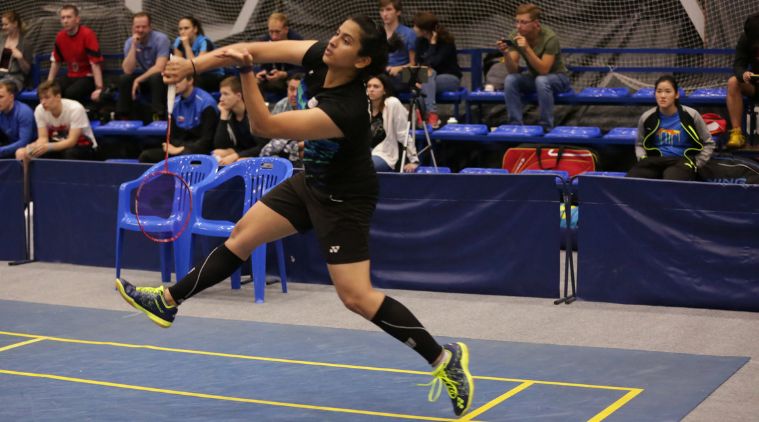
Anoushka suddenly started to gain weight despite her punishing 8 hours of training due to her PCOD condition.
Because it was a club, members would stake claim on their recreational playing hours. “We had the court for one and a half hours with 10-15 people playing on the court. The struggle was we were ready to put in the hours but didn’t have that facility. And the whole day was about training in bits and pieces,” she recalls of her early Ahmedabad years.
Promising talent
She’d win her first All India doubles title at the U-15 level, in 2011 – a selection tournament for the Asian Championships, her first international where she won bronze. A 2014 back injury stubbed her singles career, though she liked doubles and did well – one of the few to choose the paired event, and heading to Hyderabad where there was a dedicated doubles batch training at the highest level. She would play mixed doubles with Saurabh Sharma and while she struggled with the onset of PCOD, the duo made the final at Kharkiv’s Ukraine International in 2017 and won the title in 2018 beating a Polish pair. “We had a very good rapport on and off court. He (Sharma) tells me till date we had the best communication because our communication was so clear,” she says.
Yet, moving out hadn’t worked out the way she’d have liked. Anoushka reckons it was overtraining that precipitated her PCOD, though no cause was definitively established. “After all these years when I try to see it, it was overtraining. Basically, it was stress-induced PCOD. There are different types. Some are genetic, some are medication-related. Mine was kind of stress-related, is what I feel. Which was due to overtraining. I figured this out because after I came back to Ahmedabad during the lockdown, my training had gone down to like, one hour a day. I was eating normal food. And I lost 10 kilos. My period got regular to like 3-4 days. That’s when I realised overtraining was what was troubling me,” she says.
Anoushka had struck a fine working equation with former international and coach Pradnya Gadre, whom she credits with upgrading her doubles as the international level got super technical. “I always give a lot of credit to Pradnya didi, because later on in my career when I shifted to mixed doubles, she had changed my game entirely, and it worked really well.”
While her game was getting chiselled, her struggles with PCOD which she attempted to manage by trial and error in absence of a “medicinal cure”, continued. “I’d say that firstly talk about it. As female athletes if we don’t talk about it, we can’t expect the coach to bring it up. If you are not talking about it and still going through it, it’s still on you. That you did not even tell the person or know how they’ll perceive it. I don’t mean to blame one coach, one academy. It is the overall system. I was a victim but it was not because of the people. It’s how we are. It was about not having the knowledge.”
She read “like a bug”, obsessively, and tried myriad diets, stumbling through a dark alley.
For someone whose early days after starting her periods went “hassle-free”, talking about menstrual issues wasn’t something she’d given a thought to, even at home. “I did not have knowledge, the coach never asked, even my parents, to a certain extent. My mother would understand that ‘yes, you are not feeling well.’ But there was zero knowledge about how things should be dealt with. Until I started to see a difference in myself in Hyderabad and figured there’s something that might be off here.”
Always prone to training more than was expected of her, Anoushka had simply continued in the same vein in Hyderabad. “There wasn’t really a time when I had to take a day off training because of my periods as a teen. Or at least it wasn’t a pattern. Again, I was this kid who would never take a day off, injuries were the only reason I would take a break. And that’s when my coach would tell me, please take a break. So that did not affect me till I went to Hyderabad. So, I did not have to come up with this conversation also about wanting time out,” she explains.
Clumps of hair when brushing began to scare her. “I had a lot of hair-fall. There was a point when you could see patches over here on my head whether I’m washing or combing my hair. Hair-fall was a big thing. I used to get a lot of acne also. And bloating. So, a couple of days before I’d get my period, I’d gain up to 2 kg. But there were sleep issues also. Like initial 6-8 months, I had sleep trouble,” she recalls, beyond the unusual weight gain.
Eating disorders
While Anoushka was availing the help of a nutritionist, her eating patterns went berserk. “Weight loss through food was out of question because I was having the same academy food. I was trying to eat right, go low on carbs, but I was training so much. So, I did not have enough energy at times. Because if you are playing 8 hours, you need carbs. There were times I used to binge eat so much junk. To be honest, I used to google at times, ‘Do I have an eating disorder?’ So, I would eat so much of right food, but I would eat so much of wrong food also. So, I was also not helping myself over there. It became a bad cycle.”
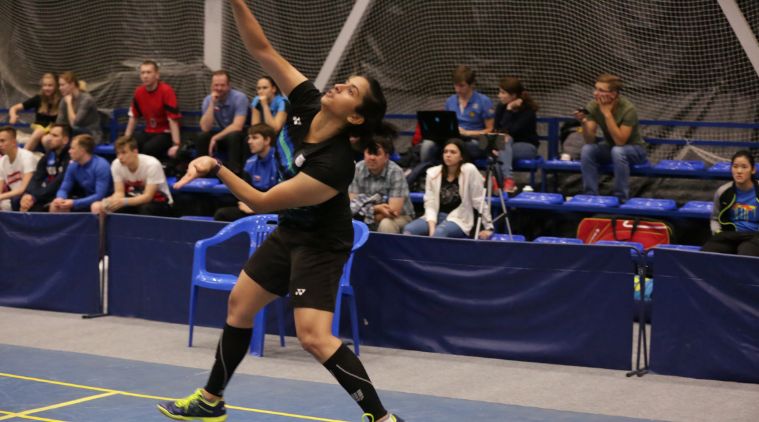
Anoushka suddenly started to gain weight despite her punishing 8 hours of training due to her PCOD condition.
Her disturbed sleep routine meant recovery would get slower. Her Vitamin D3 levels – the first thing that’s checked if soreness and fatigue is persistent – were at 9 (Below 20 is deficiency, 20-30 is ‘insufficient’). “It became a vicious cycle, which eventually I did not know how to break.”
Anoushka would get down to trying to figure what would work for her, even as performance pressure of training at a top academy wasn’t exactly bearing down on her. “I would give that to Gopi sir because he always told us that. He wouldn’t scold us for losing but focused a lot on the process. He’s like if you are doing your process right, results don’t matter. And this is something that I take away, that’s when I started focusing so much on the process. That every little thing has to be done correctly.”
She was aware that being lighter in badminton was a boon but couldn’t keep the jibes from strangers at bay. “Being lighter always helps with your movement, with preventing injuries. So, it’s always better to be lighter. But if someone is overweight, try to figure out why and change it rather than just commenting. It reached a point where I told people if ‘you don’t have solutions, don’t tell me. Because I also know I’m overweight. So don’t rub it in my face anymore.’”
She genuinely believed strokes could’ve helped her compensate for the slower movement. “Practically, I’ll play strokes where I don’t have to move. So rather than go by a herd mentality, make individuality matter. Have the same intensity, but change the training phases. That’s what doesn’t happen.”
It had begun to take a mental toll, though. “In my case, I was someone who could joke around and laught at myself. So, I did not sit and cry over it. But after a point, you feel you are being stereotyped. And it’s not only for people who are on the heavier side, but also for people who are lean and skinny. Even for them, it does the same. They can also be body- shamed, right? It’s important to not do that at all. I make it a point to not judge someone by their weight, not to make a comment on that at all. And if you have to say something, choose your words wisely,” she says.
Giving it up
Reconciliation with a sport she doesn’t play anymore looks tough. “I would not blame PCOD for scarring my career. But the entire environment that it built, the by-product it created. That I was not able to perform at times. I was mentally and emotionally at a low. There came a time when I didn’t want to see the court. I just didn’t want to go on the court. A sport I played for 17-18 years and I come out and say, ‘I won’t play it anymore. It doesn’t give me any joy.’ To want to stop doing what you are doing is bad. I also know 15-20 percent I could’ve done better. But it did not work out. There are times when maybe I did not give my 200 percent. But the entire thing just did not play out right,” she says, having gone on to finish her online degree in Psychology from the University of Massachusetts.
At one point of time Anoushka Parikh was ready to quit badminton.
Looking back, Anoushka teases out the recurring regrets that flash before her eyes at times. “I was like, damn, the thing that I loved doing, did this to me. Of course, it felt good to lose weight later. I felt a lot better. Lot in health changed. But I keep thinking, how did we not see this or deal with it then?”
She has words of advice for the countless athletes she reckons might be suffering silently and quitting at 20-21. “In these cases, it is an endocrinologist that you need to consult. And not always a gynaec. We are dealing with hormones, so we need to be seeing an endocrinologist,” she says.
She can put some distance between herself and the nightmare badminton turned into, though. “PCOS is an interesting topic, and I’d love to be able to master knowledge of it at some point and help someone. It needs a lot of trial and error. And it’s difficult to sort it out on your own.” And she knew her brain hadn’t gone stupid.
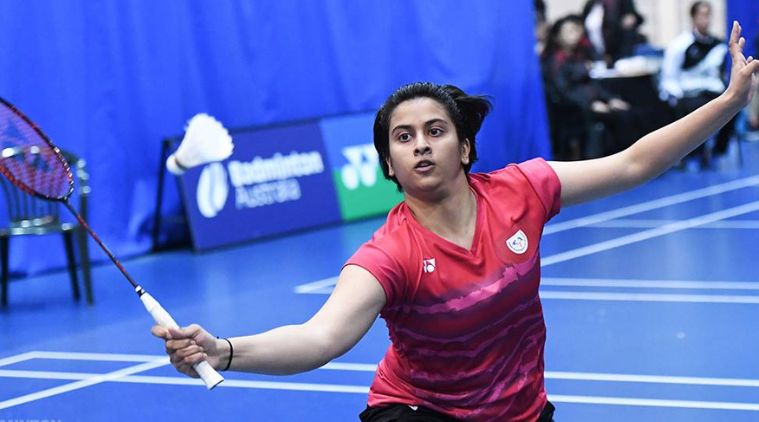
My Message to fellow athletes
In addition to what I said about talking openly, and doing what’s best for your nutrition, etc.
* Track your period – EVERYDAY. Not just the 5 days. Track how you feel – physically and mentally everyday. Get to know what phase of the cycle you are in and learn to train accordingly.
* Treat your symptoms – period is normal, pain is not. Understand your symptoms (PMS) better and focus on resolving it.
* Find your support system. Don’t hesitate to ask for help.
* Among the many symptoms that I mentioned (acne, bloating, craving), I used to have a lot of mood swing – I would be very irritable and easily angered. I learned not to be harsh on myself then or make decisions in haste.
– Anoushka Parikh

